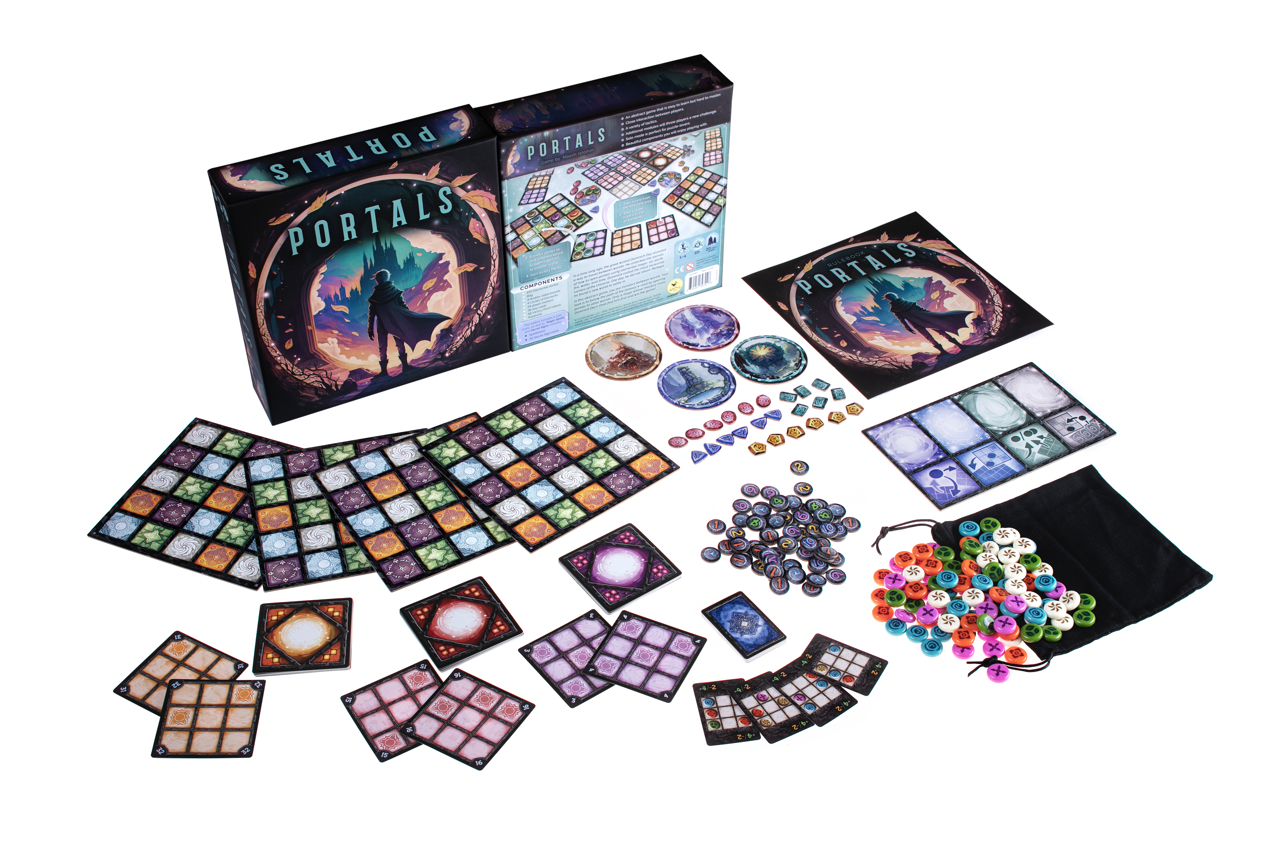06 February 2024
|
Portals is the game that says – don't over think it. An abstract game that won't move mountains, but stands out as one of the better in recent memory.
Is Portals an Abstract Game?
When Azul put proper abstract games right back on the map back in 2017, it was a breath of fresh air. It was tactile and gorgeous, won a slew of awards, and triggered several more successes under the same brand. But it remains the only abstract strategy game in the Board Game Geek Top 100 today.
While I don’t think Portals is going to trouble the BGG top tier, I have had a lot of fun playing it of late. The game has a similarly gorgeous look thanks to a bag of beautifully tactile stones every bit as lovely as those in Azul. It also boasts a similar mechanism of placing them randomly onto coasters (sorry, I mean ‘circles of elements’) for players to select. But despite appearances, the games are very different beasts.

How do you play Portals (the Board Game)?
Once you’ve glossed over the game’s incredibly thin layer of fantasy veneer, what you have is a tight game of tactical opportunity. Each player has both a coaster and a 5x5-square game board on their left and right. At the start of a round, six stones are placed on each coaster. You’ll be taking three stones from each coaster in a round, in the order that suits you.
In the middle of the table are six face-up 3x3-square cards, drawn from three separate decks. Each card has a unique number (ranging from 1-36), with lower-numbered tiles having four marked spaces, the middle three, and the highest two. On your turn, you’ll always take a stone and can optionally take any card from those on display (or a random one from the top of a deck).
When you take a stone, you must place it in a marked space on one of your cards. Once all stones have been taken, players must then transfer the stones from any completed cards onto one of their adjacent game boards. The trick here is that this is done in card number order, not player order, with the toughest cards to fill (with more stones) being placed first.
You can orient your cards in any way you like, as long as all the stones can be placed onto the game board. If the stone colour matches the board square colour you’ll score points, but you’ll also score points for any same-colour stones in the eight spaces surrounding it when you place them (ones also placed from your card that turn don’t count).

Is Portals (the board game) good?
On my first few plays the analysis paralysis (AP) was brutal; trying to math out where best to place, versus what your opponents might do, versus potential plays in later rounds. It seemed like an impossible task to plan out all the possible scenarios. It was once I learned to embrace this chaos that the game came into its own.
Players who love to math things out to the Nth degree probably aren’t going to enjoy Portals. This is a game of making the most of your opportunities and gazumping your opponents by getting to the right places at the right times. Spot those best-laid plans of others and jump into their spot just before them. Oh, the satisfaction when someone realises you’ve got the jump on them and there’s nothing they can do. As with Azul, it’s all about timing. Here, it’s the card order mechanism that elevates the game above the competition.
Some will also hate the scoring, as everything can seem to get you one point. But in a game of inches, that is exactly what makes it sing and why you shouldn’t spend too long thinking each move through. Spot the opportunities and act. Played that way, Portals is one of the better abstract games to come along in recent memory.
Chris Marling
Should you play Portals (the Board Game)?
Yes – it's great for lovers of highly tactical puzzle games, as well as being gorgeous.
TRY THIS IF YOU LIKED... Azul
Portals is different enough to feel like a very different experience but ticks the same competitive abstract boxes.
What’s on the box?
Designer: Maxim Istomin
Publisher: CrowD Games
Time: 20 minutes
Players: 1-4
Age: 10+
Price: £38

What’s in the box?
- 100 resin stones
- 4 double-sided boards
- 5 small boards
- 90 cardboard tokens
- 56 square cards
- 1 rulebook







